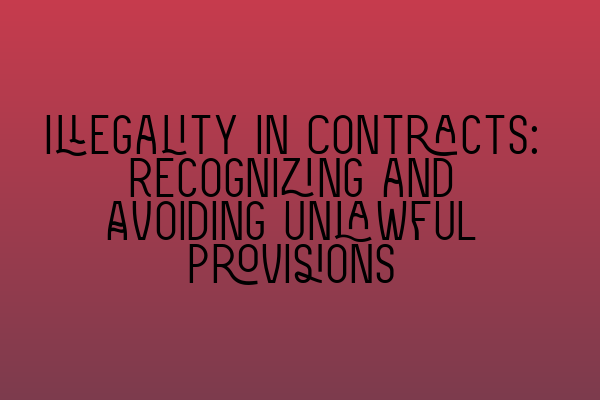Illegality in Contracts: Recognizing and Avoiding Unlawful Provisions
Welcome to our Contract Law blog, where we strive to simplify complex legal concepts and provide valuable insights for both professionals and students alike. In today’s article, we will delve into the topic of illegality in contracts, discussing the importance of recognizing and avoiding unlawful provisions. Understanding the implications of illegal contracts is essential for anyone involved in contractual agreements, whether as a solicitor, business owner, or individual entering into a contract.
Before we delve into the details, let’s establish a clear definition for illegal contracts. An illegal contract is one that involves an agreement to perform an activity that is prohibited by law or goes against public policy. These illegal provisions render the entire contract unenforceable and may lead to severe legal consequences for the parties involved.
The Dangers of Illegality in Contracts
The presence of an illegal provision in a contract poses several risks to both parties involved. These risks include:
- Unenforceability: An illegal contract is considered void ab initio, meaning it is invalid from the beginning. This implies that neither party can seek legal remedies in case of a breach of contract. This lack of enforceability can result in significant financial losses for businesses and individuals.
- Penalties and Fines: Engaging in illegal activities or entering into an illegal contract can lead to legal penalties, fines, and even criminal charges. When a provision of a contract is deemed illegal, the consequences extend beyond the contractual agreement itself.
- Tarnished Reputation: Being associated with illegal activities can harm a party’s reputation and credibility within their industry. This can have far-reaching effects, including the loss of business opportunities and damage to professional relationships.
Given these risks, it is crucial to recognize and avoid unlawful provisions in contracts. This requires a thorough understanding of contract law principles and awareness of potential pitfalls.
Recognizing Illegality in Contracts
To identify illegal provisions in contracts, solicitors and individuals must carefully analyze the terms and conditions of the agreement. Here are some common scenarios where illegality may arise:
- Contrary to Statute: Contracts that blatantly violate statutory or regulatory laws are considered illegal. For example, an agreement to engage in illegal drug trafficking or to commit fraud would be unenforceable.
- Against Public Policy: Contracts that go against public policy, even if not specifically prohibited by statute, can be considered illegal. This includes agreements that promote discrimination, harm public safety, or restrict fair competition.
- Restraint of Trade: Contracts that impose unreasonable restrictions on trade or competition can also be deemed illegal, as they restrict free market principles. Non-compete agreements between employers and employees are examples of potentially unlawful provisions.
It is essential to consult legal counsel or a qualified solicitor to determine whether a contract or specific provision is illegal. They will have the expertise to assess the legality of contractual terms and provide guidance on potential modifications or alternative approaches to achieving the intended goals.
Avoiding Unlawful Provisions
Now that we understand the risks associated with illegal provisions, let’s explore some practical steps to avoid them:
- Consult with a Solicitor: Seeking advice from a solicitor who specializes in contract law is paramount to ensure that your contracts comply with legal requirements. They can review your contracts, provide guidance on potential issues, and suggest necessary modifications to avoid illegality.
- Keep Up with Legal Updates: Laws and regulations evolve over time, so it’s important to stay informed about any changes that may impact your contractual agreements. Regularly review legal updates or consult a legal expert to ensure your contracts remain compliant.
- Include Severability Clause: Including a severability clause in your contracts can help protect parties from the consequences of illegality. This clause states that if one provision of the contract is deemed illegal, the remaining provisions will remain valid and enforceable.
By following these steps and working closely with legal professionals, individuals and businesses can minimize the risks associated with illegal provisions and ensure their contracts are lawful and enforceable.
For more information on related topics, we invite you to explore the following articles:
- Interpreting Contractual Clauses: Unlocking the Hidden Meanings
- Agreements in Contract Law: Understanding Its Various Types
- Essentials of Consideration: Understanding the Basis of Contractual Exchange
- Contract Law Tutorials: Simplifying Complex Concepts for Students
- Discharge of Contracts: Modes and Consequences Explained
We hope you found this article helpful in understanding the implications of illegality in contracts. Remember, legal advice is essential to ensure your contracts are valid and enforceable. Stay tuned for more informative articles on contract law and related topics.
